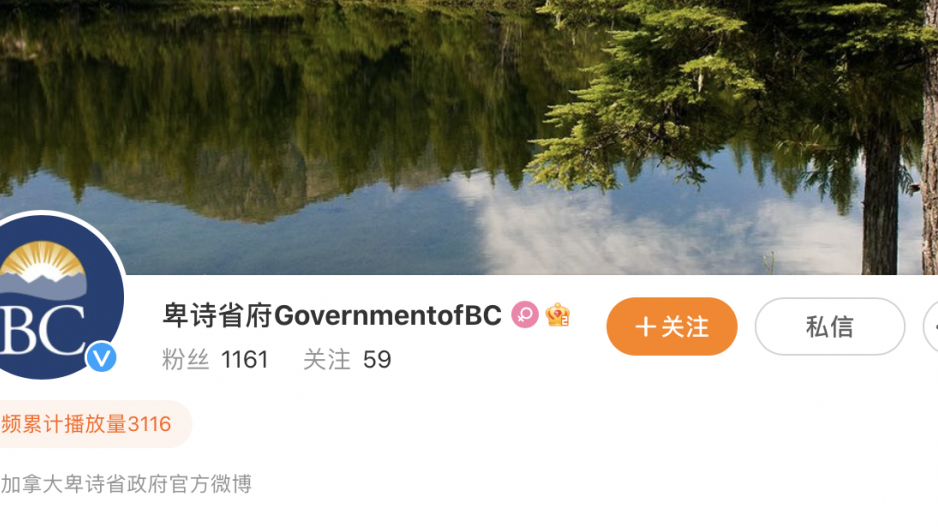The B.C. government says it is being “very cautious” with the launch of its Weibo account “out of an abundance of caution.” But local critics of the Chinese government say the move amounts to “wilful blindness” of serious threats to British Columbians.
On Wednesday, the B.C. Ministry of Municipal Affairs announced it launched a new account on Weibo. The social media platform is extremely popular in China but also faces regular censorship by the country's government.
Minister of Municipal Affairs Anne Kang said the B.C. government’s social media expansion aims to deliver government information to Chinese-only speakers in B.C., via simplified Chinese messages.
The B.C. government’s Weibo channel already has more than 1,100 followers and has published more than 47 posts, according to a ministry statement.
Ministry spokesperson Jill Dickau said B.C. residents do not need to register on Weibo or download the phone app to see the B.C. government’s posts. But Fenella Sung, founding convenor of Canadian Friends of Hong Kong, says the account de facto encourages British Columbians to do so.
“I think this is another wilful blindness operation because there is no way that any measure would be able to safeguard the individual devices of British Columbians against infiltration and control of the [Chinese Communist Party]; so they have chosen to ignore the issues,” said Sung, who is also works as a translator, writer, broadcaster and intercultural communicator.
Concerns over the B.C. government's move to launch an account on Weibo come as Canada grapples with questions over foreign influence and alleged interference in elections by the People’s Republic of China and the Chinese Communist Party (CCP).
“Connecting to Weibo is connecting to the CCP surveillance system,” said Ivy Li, also a writer and member of Canadian Friends of Hong Kong, which advocates for democratic reform across China.
“Our government is now making it easier for the CCP to monitor the Chinese community here in B.C.”
Concerns over cybersecurity
While both Sung and Li raised many questions about cybersecurity, Dickau said in an email that the B.C. government is taking steps to ensure no private data is shared through the social media platform.
Dickau said Weibo “is not being downloaded to or used from any Government assets such as computers or cell phones.” She added that a third-party contractor is responsible for day-to-day account administration “at arm’s length from government.”
Further, Dickau said B.C. government is not retaining any public information and “no private information is shared on the government’s Weibo channel.”
But Li worries the Chinese government will be able to censor B.C. government posts, and it's unclear how provincial authorities or their contractors will monitor for such an instance.
“We must remember that Weibo is not a normal social media platform in democracies,” said Li. “It is 100 per cent controlled by the CCP. The owners and staff on Weibo, as long as they have Chinese citizenship, they are legally required by the PRC laws to co-operate with PRC intelligence agencies.”
Weibo comments section vulnerable to propaganda
Li said the B.C. government's Weibo account could also be vulnerable to Chinese nationalists and propagandists who want to influence British Columbians through the account’s comments section.
Glacier Media asked who the third-party contractor is and how much money the government is paying operate its Weiboaccount. It also asked if the Weibo app is allowed on government worker cell phones. The ministry did not respond to these questions by time of publication.
Canadian attempts to have a presence on Weibo have ended in censorship in the past, according to the Australian Strategic Policy Institute. A 2018 report from the think tank noted Weibo has censored the Canadian Embassy in China on several occasions going back to a 2011, when references to the religious group Falun Gong were immediately deleted.
Three years later, comments on a photo of former a Canadian ambassador at Tiannamen Square appeared to be censored, claimed the think tank. And in 2017, a live-stream by Prime Minister Justin Trudeau was delayed several hours — an “abrupt cancellation” the institute attributes to Weibo censors.
As of Wednesday, Glacier Media could not find any Canadian provinces or American states that have Weibo accounts.




